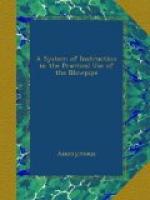(8) Special reactions. Fused with
potassa in platinum has no action on
silver.
Cobalt-solution produces the alumina
reaction.
* * * * *
Mineral. Native Alum
Formula. [.R][...S] + [...Al][...S]^{3} + 24[.H].
Behavior
(1) in glass-bulb. Intumesces
greatly and gives off much water.
Strongly
heated, evolves SO^{3}, which reddens
litmus.
(2) in open tube. —
(3) on charcoal. Intumesces and become infusible.
(4) in forceps. V. Colors
the flame violet if a potassa
alum—yellow
if soda—be present.
(5) in borax. Dissolves
and gives the iron and manganese
reaction,
if these oxides be present. Otherwise
the
bead is colorless.
(6) in mic. salt. As in borax.
(7) with carb. soda. The alkali
is absorbed into the charcoal,
leaving
an infusable mass which gives the sulfur
reaction
on silver.
(8) Special reactions. If not containing
too much iron or manganese
gives
an alumina reaction with nitrate of of
cobalt.
In other respects as the preceding.
* * * * *
Mineral. Turquoise
Formula. [...Al=]^{2}[.....P] + 5[.H].
Behavior
(1) in glass-bulb. Evolves water,
occasionally decrepitates and
turns
black.
(2) in open tube. —
(3) on charcoal. Turns brown, but remains infusible.
(4) in forceps. V. As on charcoal. Colors the outer flame green.
(5) in borax. In the oxidizing
flame, gives a green bead, due
to
copper and iron. In reducing flame, opaque red.
(6) in mic. salt. As in borax.
(7) with carb. soda. Intumesces,
then fuses to a semi-clear glass
colored
by iron. With more alkali yields an
infusible
mass.
(8) Special reactions. Gives the phosphoric-acid reaction.
* * * * *
Mineral. Wavellite
Formula. [Al=]F^{3} + 3([...Al=]^{4}[.....P]^{3} + 18[.H].)
Behavior
(1) in glass-bulb. Evolves water
and some fluorine, which attacks
the
glass.
(2) in open tube. —
(3) on charcoal. Exfoliates and turns white.
(4) in forceps. V. As on charcoal.
Colors the outer flame green,
especially
if moistened with SO^{3}.




